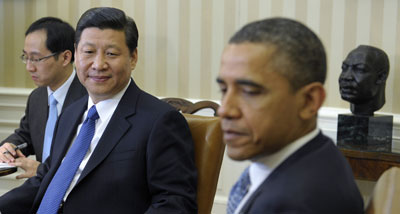President Obama has promised to raise issues of human rights when he and his administration meet with Chinese Vice President Xi Jinping in the next day. After that, Xi, billed as China’s next leader, is expected to make some speeches, visit a few factories, stop at the Pentagon, sign some contracts that will strengthen economic ties between the two countries, and then head home.
Yesterday, CPJ sent a letter to Obama asking that he raise the issue of jailed journalists, restrictions on access for foreign and domestic reporters to areas of ethnic and civil unrest, and the heavy-handed approach of the Central Propaganda Department in trying to control the country’s increasingly dynamic mainstream media. But we have no illusions: Human rights and media freedom will take a back seat as relations with China revolve more and more around economic and security issues. The emphasis is to establish a mature relationship between the two superpowers, who are increasingly engaging with each other as peers.
But is China ready for this sort of meeting of equals? A few days ago, according to the BBC, the government “confirmed” that 19-year old Tibetan nun had set herself on fire, protesting what she considers anti-Tibetan policies in China. Apparently, at least 20 Tibetan nuns and monks have set themselves on fire in the past year, but the number is hard to confirm because international media are denied access to the area in Sichuan province where they have taken place.
Online mentions of Tibetan protests and self-immolations have been disappearing, as documented by the University of Hong Kong’s China Media Project. Today, it noted that CMP researcher David Bandurski’s own Sina Weibo post was deleted; it had shared the Guardian‘s clandestine coverage of Chinese authorities’ aggressive suppression of protests. (Guardian reporter Jonathan Watts describes sneaking pass police checkpoints to get into Sichuan province’s Aba prefecture, and said that Internet and cell phone signals had been blocked.) Last week, Caijing journalist Luo Changping’s post about official warnings on social stability in Tibet was deleted. Investigative reporter Liu Zhimin’s post on self-immolations in Tibet was also deleted, even though it relied on week-old reporting from the official Xinhua News Agency.
Xinhua, and the Party-controlled Tibet Daily, are almost the only sources of news you’ll find on the Tibetan protests in traditional media within China–and you have to dig for it. This English-language Xinhua story describes the importance of stability after a series of self-immolations in Tibetan regions; the article describes “mob attacks on police offices.” The official Chinese-language coverage tends to be even more direct in blaming lawless elements, directed remotely by the Dalai Lama, for violence and chaos. This story from a state-controlled Tibetan news website says that Internet users worldwide have condemned the Dalai Lama for the bloodshed.
CPJ is accustomed to seeing the same sort of reporting and access restrictions in much more poorly developed countries like Burma, Pakistan, Sri Lanka, and Indonesia, where entire swathes of the country are cut off to foreign media. But the United States does not meet with them on the same footing as with China.
In fact, like those lesser developed countries, China is under tremendous internal pressure. Its surging economy has led to class and regional inequalities that harken back to the pre-Communist feudal era, while ethnic struggles with Tibetan and Muslim groups in the west of the country are centuries old. Muslim secessionists are growing as a threat, fueled by cross-border contact with Tajikistan, Uzbekistan, Kyrgyzstan and even China’s traditional ally, Pakistan. All these are no-go areas for foreign reporters or Chinese reporters from other regions. And while the media in the eastern big cities like Beijing, Guangdong, and Shanghai have been persistently pushing censorship limits with aggressive reporting, no such thing exists in areas of ethnic tension. CPJ’s list of journalists in jail in China consists increasingly of Muslim and Tibetan online activists who use their access to the Internet to press their political agendas until they are whisked away to prison. As with Tibet, the only news coming from these areas is the fully sanctioned, government version. There is no independent reporting.
These sorts of media policies do not make for a mature partner on economic or security issues, and they have to be addressed if the United States and China are going to move forward. A country that is building a dynamic economy bolstered by authoritarian media policies that are decades old is not a peer. And for those who dismiss concerns about what they see as mere human rights issues like media freedom, they must realize they are dealing with a flawed partner, one intent on suppressing and distorting the political reality that lies at the base of its economic power. No matter its economic or military strength, without fully opening its traditional and digital media, China must be seen as a flawed partner, one not secure enough within its own population to be a full-fledged player on the international stage.
